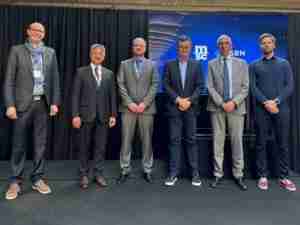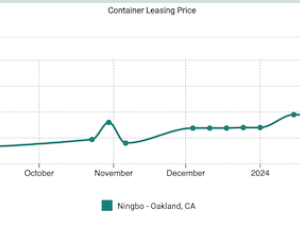Cosco Shipping Offers $6.3 Billion to Buy Orient Overseas
By: Bloomberg News | Jul 09 2017 at 09:35 PM | Liner Shipping
Cosco Shipping Holdings Co. offered $6.3 billion to acquire the container carrier controlled by former Hong Kong Chief Executive Tung Chee-hwa’s family in a deal that would catapult the mainland Chinese group into world’s third-largest shipping line.
State-owned Cosco will pay shareholders of Orient Overseas International Ltd., Hong Kong’s No. 1 box mover, HK$78.67 a share in cash, a 31 percent premium over the stock’s last closing price. The Tung family, which founded Orient Overseas Container Line in 1969, has accepted the offer, which still needs regulatory approvals and consent from Cosco’s investors. Orient Overseas surged as much as 25 percent in Hong Kong, the biggest intraday gain in eight years, while Cosco jumped as much as 8.1 percent.
The combined entity would surpass France’s CMA CGM SA and move closer to A.P. Moller-Maersk A/S and Mediterranean Shipping Co. by capacity. Container lines from Denmark to Japan have pursued acquisitions as too many ships and companies chasing the same trade has led to a collapse in freight rates and burgeoning losses, reasons that pushed Hanjin Shipping Co. of Korea into bankruptcy last year.
“This looks like a happy ending for both parties,” said Han Ning, China director for Drewry Shipping Consultants Ltd. “Cosco can benefit from OOCL’s strong presence on routes from the Far East to Australia and to the U.S. The company’s operational efficiency has long been admired by outsiders as well.”
The enlarged company will operate more than 400 vessels with capacity exceeding 2.9 million twenty-foot equivalent units, including order book. Cosco currently has a market share of 8.4 percent while Orient Overseas has 3.2 percent, according to Alphaliner. Their combined 11.6 percent share would make the merged entity the third-biggest container-shipping company, overtaking CMA CGM with 11.2 percent, according to the shipping data provider.
UBS Group AG advised the buyers, while JPMorgan Chase & Co. worked with Orient Overseas.
Tung’s family controls Orient Overseas International with about 69 percent holding. Shares of the company have rallied almost 90 percent this year in Hong Kong, compared with a 15 percent gain in the benchmark Hang Seng Index.
If the offer is accepted by the rest of the shareholders, Cosco and its unit will have to pay a total of about HK$49.2 billion ($6.3 billion) to close the transaction, they said.
“This decision has been carefully considered and we believe it helps ensure the future success of OOIL,” Andy Tung, chief executive officer of Orient Overseas, said in a statement. “We are confident that Cosco Shipping Holdings is the right partner for us.”
Sufficient Resources
On completion of the deal, Cosco Shipping will hold 90.1 percent of Orient Overseas, while Shanghai International Port will hold 9.9 percent. The buyers plan to keep the shares of Orient Overseas listed after the closing of the offer and commit to retain all employees and their benefits, they said.
The heads of Maersk and Hyundai Merchant Marine Co. have said in the past that Asian container lines are set for further consolidation in 2017 as firms join forces to cut costs and improve efficiency.
The shipping industry is “fragmented ” and consolidation can help transform the business for the benefit of customers, Maersk, the world’s biggest container operator, said Monday in reaction to Cosco’s takeover. There is a consolidation wave in the industry and it is difficult to say how big it will be, the company said.
The global container industry has been in turmoil since the 2008 financial crisis brought trading to its knees. South Korea’s biggest container-shipping line Hanjin filed for bankruptcy protection last year while Maersk restructured its operations.
CMA CGM then completed a $2.3 billion acquisition of Neptune Orient Lines Ltd. Japan’s Nippon Yusen KK, Kawasaki Kisen Kaisha Ltd. and Mitsui O.S.K. Lines Ltd. agreed to merge their container operations, creating a company with about 6.9 percent market share. Maersk also agreed to buy Hamburg Sud for 3.7 billion euros.
The three Japanese shipping lines all climbed more than 3 percent in intraday trading in Tokyo on Monday.
“This might be the last of the major M&As we see in the shipping industry,” said Jason Chiang, Singapore-based director at Ocean Shipping Consultants. “Bad times in the industry made M&As necessary but with rates recovering that need will become less.”





